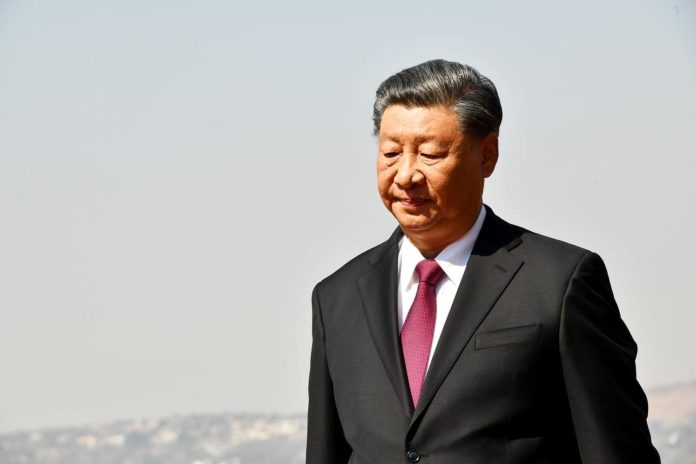August was a bad month for China. Mounting reports buttressed the view that China’s economy is not only in a downturn, but faces daunting long-term obstacles and declining confidence among its citizens.
Beijing objected to leaders from the United States, Japan and South Korea meeting together and calling for “peace and stability across the Taiwan Strait” and criticising China for “dangerous and aggressive behaviour” in the South China Sea. A few days later, US, Japanese, Australian and Philippine naval vessels conducted a joint exercise in the South China Sea. A US study concluded that during the two months after the Chinese government abruptly lifted its pandemic restrictions, nearly two million Chinese died of Covid-19, undermining the narrative that China’s government handled the pandemic well.
President Xi Jinping’s rule has clearly been a boon to the Chinese Communist Party (CCP). Recent developments, however, call into question whether Xi is capable, or will ever be capable, of ensuring it is good for Chinese citizens as well.
Xi inherited several large problems to solve. The first was the economy. China required a new economic model that could continue to sustain high economic growth. The Chinese government also needed to foster innovation so that China avoids stagnating in the middle-income trap. The Politburo was committed to tackling these problems through additional economic reforms and by giving the market more power to determine the allocation of resources.
In its foreign relations, Beijing had to manage China’s growing relative power to avoid provoking other countries into forming defensive anti-China coalitions and closing China’s access to markets and technology. Finally, it was essential that the Chinese government contain domestic unrest to prevent internal turmoil from disrupting overall national progress.
Xi has sought to make the Party dominant in Chinese life. He rejuvenated the Party’s reputation through an anti-corruption campaign, shifted governing authority from state offices to Party offices, and greatly expanded the Party’s supervision of political and economic activity. Xi’s moves to re-centralise decision-making – including making himself chairman of the most important “leading small groups” that frame policy and establishing a cult of personality – undo the efforts of previous Chinese leaders to preclude a repeat of the disasters that an excessively-powerful Mao Zedong unleashed upon China. While Deng Xiaoping substituted pragmatism for ideology, Xi has done the reverse, extolling the idea (if not the practice) of Marxism and vilifying liberalism.
The Chinese government under Xi has largely maintained order through heavy-handed surveillance and police powers, but at a cost. Reports told of middle-class Chinese seeking to emigrate to escape the pandemic lockdowns. Xi dealt with the problem of Uyghurs feeling they are a suppressed people by mass incarceration, which is likely to create widespread and lasting resentment.
The prospects of Xi’s approach successfully managing the maturation of China’s economy look dim.
China cannot continue to rely on expanding exports and building homes, offices and more infrastructure to power the country’s economic growth. The factory working-age population is shrinking and becoming more expensive, and the world cannot absorb infinite Chinese exports. China’s cities are already overbuilt.
The obvious alternative is to steer the economy toward relying more heavily on domestic consumption as a sustainable driver of growth. Xi, however, reportedly opposes this model. He thinks it a wasteful and indirect way to foster strategically important industries and believes it will create a lazy populace reliant on government handouts.
China under Xi has continued to prioritise a government-controlled economy over letting the market dictate economic activity. Xi’s government indulges relatively inefficient state-owned enterprises while burdening the more innovative private sector. The Party’s increased oversight of economic affairs means the decision-making of individual companies must be politically correct. Tens of millions of Chinese elites are forced to divert their attention from productive pursuits to the study of “Xi Jinping Thought”. The anti-corruption campaign has had the downside of paralysing the officials who might otherwise be carrying out reforms.
In international affairs, while making some gains in the Global South, Xi has presided over a deterioration of relations with the United States, Australia, Japan, India and Western Europe, which collectively control the bulk of the world’s economic, political and military power. The revived Quad, AUKUS, US-Japan-Korea trilateral cooperation, and the US campaign to restrict China’s access to advanced technologies are all reactions to perceived aggressive behaviour by China. Xi’s handling of the pandemic, the South China Sea, Hong Kong, and Russia’s invasion of Ukraine have badly damaged China’s reputation among the wealthy democracies. Toward Taiwan, the Xi government’s thinking is so fixed that it continues to extoll the “one country two systems” model, which had no appeal in Taiwan even before the crackdown on civil liberties in Hong Kong.
Xi’s enduring tenure forces China’s political elites to confront an uncomfortable truth: the divergence between what is good for the Party and what is good for the country seems to be widening.









































